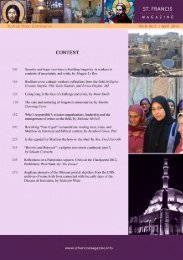Download the pdf - St.Francis Magazine
Download the pdf - St.Francis Magazine
Download the pdf - St.Francis Magazine
Create successful ePaper yourself
Turn your PDF publications into a flip-book with our unique Google optimized e-Paper software.
<strong>St</strong> <strong>Francis</strong> <strong>Magazine</strong> Vol 9, No 4 | August 2013<br />
present a brief (if playful) refutation to IM advocates. He focuses on three areas: <strong>the</strong>ology of religion,<br />
Scripture, and conversion. I felt that he spent much of his time in Scripture. But, since IM is an<br />
evangelical debate, and evangelicals all say that <strong>the</strong> Bible is <strong>the</strong> final authority on doctrinal questions,<br />
this was, I suppose, inevitable.<br />
Throughout <strong>the</strong> book <strong>the</strong> author spends a significant amount of time repudiating two authors in<br />
particular: Rebecca Lewis and Kevin Higgins. He also takes issue at times with folks like Dudley<br />
Woodberry and Mazhar Mallouhi, but Lewis and Higgins are two of <strong>the</strong> key proponents of IM, and<br />
so it is appropriate that he takes <strong>the</strong>m on. And if I may use a boxing analogy, he has <strong>the</strong>m against<br />
<strong>the</strong> ropes.<br />
It is easy to say that though. Why do I think this is true Let’s take a look.<br />
IM advocates always have a ready response to any critique: but that’s not what we’re talking<br />
about at all! Morton gets that and, to his credit, he starts his book by laying out two of <strong>the</strong> mostquoted<br />
definitions of IM given by IM advocates. They are those of Rebecca Lewis and Kevin<br />
Higgins (p 4). But I’m sad to say he misses here, because he does not identify one of <strong>the</strong> main (and<br />
most sloppy) missteps of IM advocates: <strong>the</strong>y define Biblical IM into existence. Look at Higgins’<br />
definition, wherein IM is defined as ‘faithful disciples of Jesus’ or Lewis when she ‘describes’<br />
‘obedient faith in Christ…’ As I tell my kids: no cheating.<br />
The whole question, friends, is whe<strong>the</strong>r IM’s could indeed be ‘faithful’ and ‘obedient’. I expect<br />
this sort of rhetorical sloppiness from my local barber who defines Islam as ‘<strong>the</strong> true religion that<br />
Allah revealed to his Prophet…’ But we are in a place where scholars and practitioners of mission<br />
are trying to figure out if <strong>the</strong>se are faithful and obedient. They may well be sincere, but that is not<br />
<strong>the</strong> question.<br />
Lewis and Higgins have done us a great disservice. They do not provide any empirical case studies or<br />
evidence showing that <strong>the</strong>y have actually observed such movements. Nor do <strong>the</strong>y reference case studies by o<strong>the</strong>r<br />
people. They assure us <strong>the</strong>y exist– that is all. That is not sufficient for a debate that appears to cut to <strong>the</strong> heart<br />
of foundational questions about who Jesus was and what he desired.<br />
But Morton misses this opening.<br />
He doesn’t miss a classic staple of IM advocates, which is <strong>the</strong> straw man. On page 8 he clearly<br />
points out how Mazhar Mallouhi, an evangelical Christian who left Christianity for ‘Jesusy’ Sufi<br />
Islam, has set up a straw man. Morton also shows throughout <strong>the</strong> book how <strong>the</strong> claim of<br />
‘extractionism’ is fake. No missionary ever intended from <strong>the</strong> outset to ‘extract’ a convert from his<br />
or her community! If IM advocates have evidence to <strong>the</strong> contrary, let us see it. Now, maybe<br />
Muslims drove <strong>the</strong>m away by, you know, trying to kill <strong>the</strong>m and stuff, but where is <strong>the</strong> fault <strong>the</strong>re<br />
Morton also calls out IM advocates on <strong>the</strong>ir over-simplification regarding culture. What<br />
missionary, even a traditional one like myself, is trying to make Arabs or Iranians or Javanese into<br />
Americans today I know <strong>the</strong>re were some attempts at this in <strong>the</strong> past, but I don’t know of anyone<br />
who is doing this now. Yet Morton cites IM advocates saying such things multiple times! Morton is<br />
right in concluding that <strong>the</strong> ‘unspoken assumption is that missionaries who disagree with <strong>the</strong> IM<br />
paradigm are squeezing new converts from Islam into <strong>the</strong> Western mold of conversion that is<br />
Christianity’ (page 12).<br />
Ano<strong>the</strong>r fallacy is pointed out on page 15. I called it <strong>the</strong> fallacy of <strong>the</strong> false middle (That is from<br />
me, not Morton). If I say, on <strong>the</strong> left are people who say that Jesus was never born, and on <strong>the</strong> right<br />
are people who say he is <strong>the</strong> Son of God, <strong>the</strong>n <strong>the</strong> wise middle is to say something more modest, like<br />
Jesus was real, but he was simply a prophet. Sound familiar It is a common fallacy, and<br />
evangelicals who rarely learn any logic are easily susceptible to it. So good for Morton, who points<br />
out such a fallacy, advanced by Kevin Higgins, in relation to Islam.<br />
Beginning with Chapter 3 Morton starts to deal with Biblical material. Some of <strong>the</strong> passages<br />
discussed here are so poorly handled by my fellow evangelical (pro-IM) Christians that I am<br />
reminded why <strong>the</strong> only Christians who read evangelical scholars (excepting NT Wright, who isn’t<br />
American) are o<strong>the</strong>r evangelicals. Here is one such example, for instance: IM is Biblical because of<br />
Melchizedek, proposes Higgins (page 19). Morton refutes <strong>the</strong>se positions, suggesting that<br />
Melchizedek may have learned true mono<strong>the</strong>ism (like that of Abraham), and that, in any case, <strong>the</strong><br />
Genesis narrative does not contain enough specific details for <strong>the</strong> IM argument to succeed. Aside<br />
from what Morton says, <strong>the</strong> Melchizedek context is one wherein <strong>the</strong>re are no ‘religions’ at all—<strong>the</strong>re<br />
are only cults to one or more deities. Abraham and Melchizedek worship <strong>the</strong> same deity and so<br />
Abraham ti<strong>the</strong>d to him.<br />
<strong>St</strong> <strong>Francis</strong> <strong>Magazine</strong> is published by Arab Vision and Interserve 53







![Reflections on Surah Fatiha and the Lord's Prayer[1] - St.Francis ...](https://img.yumpu.com/49377951/1/184x260/reflections-on-surah-fatiha-and-the-lords-prayer1-stfrancis-.jpg?quality=85)









